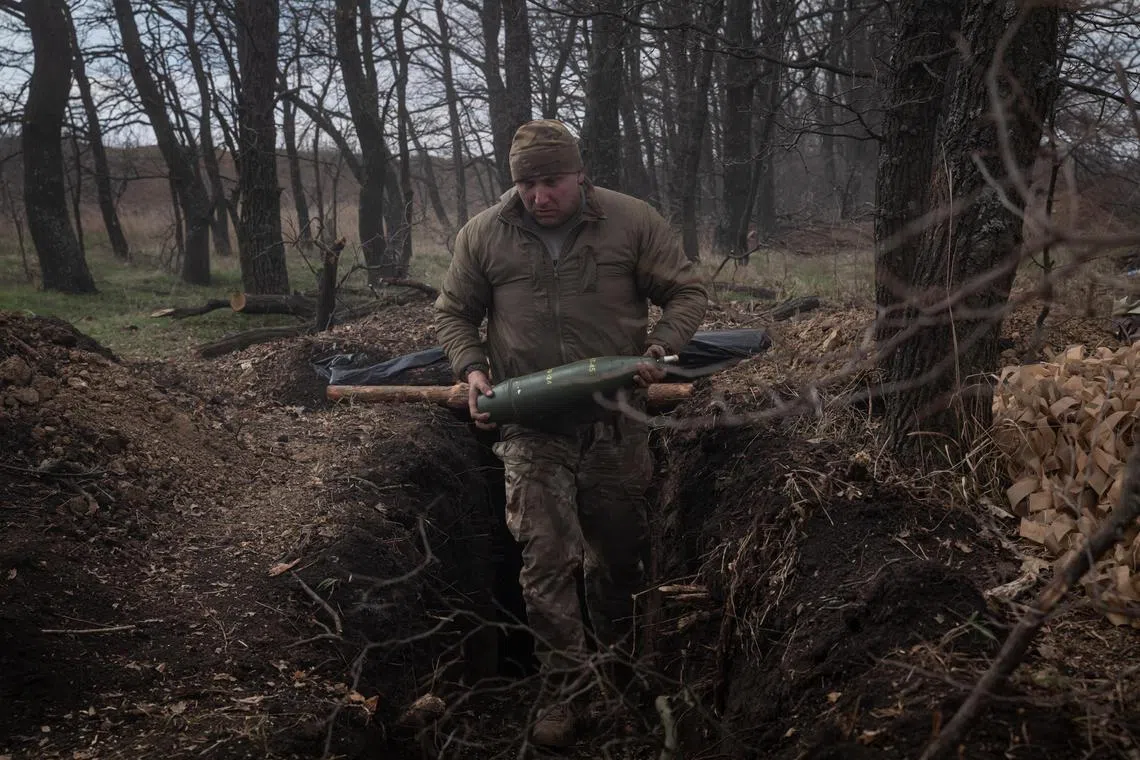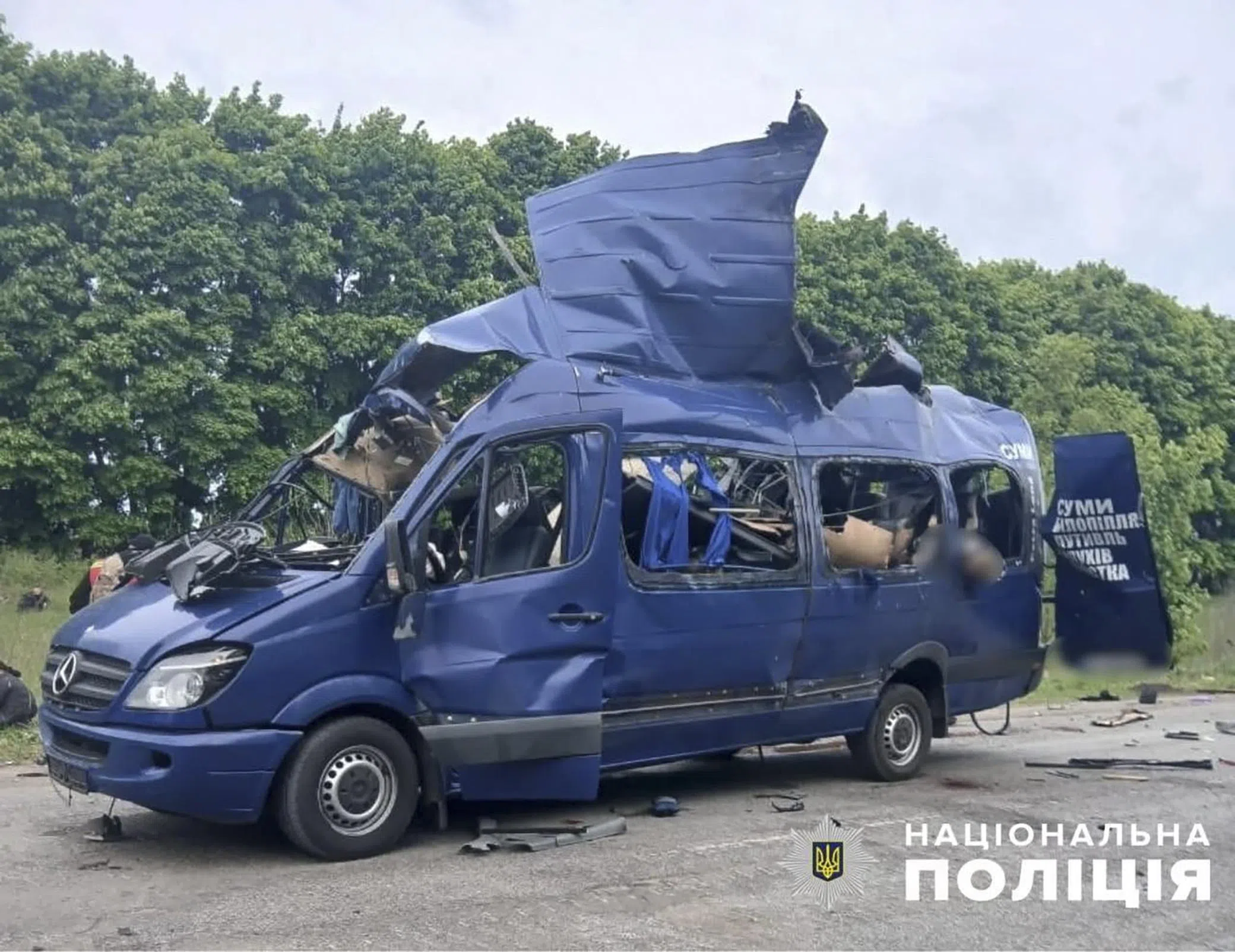Ukraine, Europe urge more pressure on Moscow after Russian drone kills nine
Sign up now: Get ST's newsletters delivered to your inbox

A soldier readies artillery shells for use on Russian targets in Ukraine’s Donetsk region. Russia-Ukraine talks on May 16 failed to broker a temporary ceasefire.
PHOTO: NICOLE TUNG/NYTIMES
KYIV – Ukrainian President Volodymyr Zelensky on May 17 called for stronger sanctions on Moscow after a Russian drone killed nine bus passengers in north-eastern Ukraine, just hours after the two countries held their first peace talks in three years of war.
The meeting of Russian and Ukrainian officials
It was the first direct dialogue between the two sides since the early months of the war that Russia launched in February 2022.
Commenting on the drone strike in the Sumy region, Mr Zelensky said on X: “All the deceased were civilians. And the Russians could not have failed to understand what kind of vehicle they were targeting. This was a deliberate killing of civilians.”
Ukrainian police posted photos of a dark blue passenger van nearly destroyed, with the roof torn off and the windows blown out.

A Russian drone attack on a minibus carrying evacuated civilians in Ukraine’s eastern Sumy region killed nine people and wounded five on May 17.
PHOTO: EPA-EFE
“Pressure must be exerted on Russia to stop the killings. Without tougher sanctions, without stronger pressure, Russia will not seek real diplomacy,” Mr Zelensky said.
He said Russia had sent to Istanbul “a weak and unprepared” delegation without a meaningful mandate, while real steps were needed to end the war.
The only result of the talks in Istanbul was an agreement on the largest prisoner exchange of 1,000 people from each side, which, according to Ukraine’s military intelligence head Kyrylo Budanov, could take place as early as next week.
“We are expecting strong sanctions against Russia from the United States, from Europe, and from all our partners. Diplomacy must start working,” Mr Zelensky stated.
US President Donald Trump, who has been pushing Moscow and Kyiv to hold peace talks, said before the two countries’ negotiators met in Istanbul that “nothing could happen”
Russian ‘obfuscation’
Speaking to Reuters in Pakistan’s capital Islamabad on May 17, British Foreign Minister David Lammy accused Moscow of obfuscating after the Istanbul talks, which ended in less than two hours.
“Yet again we are seeing obfuscation on the Russian side and unwillingness to get serious about the enduring peace that is now required in Ukraine,” said Mr Lammy. “Once again, Russia is not serious.”
He added: “At what point do we say to Putin enough is enough?”
French President Emmanuel Macron also said the talks in Istanbul had been fruitless.
“Today, what do we have? Nothing. And so I tell you, faced with President Putin’s cynicism, I am sure that President Trump, mindful of the credibility of the United States, will react,” he said during a joint press conference with Albanian Prime Minister Edi Rama.

Ukraine’s President Volodymyr Zelensky speaking on the phone on May 16 during a European summit in Tirana, Albania.
PHOTO: AFP
Mr Zelensky had challenged Mr Putin earlier in the week to meet him in person, an offer the Russian leader ignored, but according to the Ukrainian delegation in Istanbul, this possibility was discussed during the May 16 talks.
Kremlin spokesman Dmitry Peskov said on May 17 that Russia considered such a meeting was possible, but only as a result of work between the two sides to “achieve certain results in the form of agreements”.
“At the same time, when signing documents that the delegations are to agree upon, the main and fundamental thing for us remains who exactly will sign these documents from the Ukrainian side,” Mr Peskov added. He did not elaborate on that remark.
Mr Putin has previously challenged Mr Zelensky’s legitimacy as president because his elected term of office expired in 2024. REUTERS


